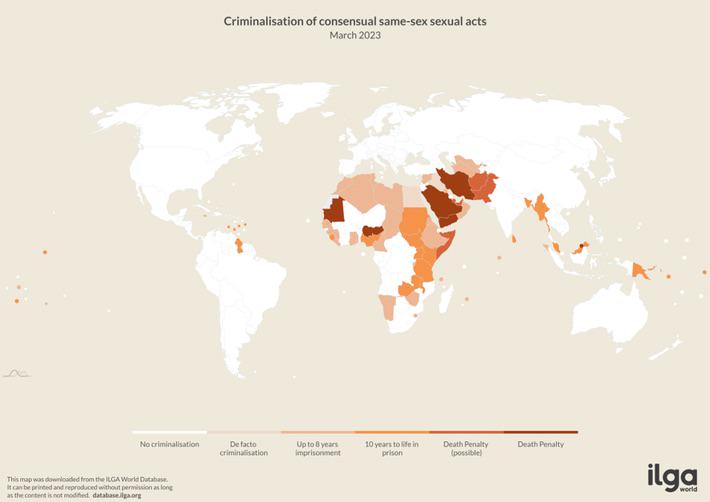Criminalisation of Consensual Same-Sex Sexual Acts Map


Alex Cartwright
Senior Cartographer & GIS Specialist
Alex Cartwright is a renowned cartographer and geographic information systems specialist with over 15 years of experience in spatial analysis and data...
Geographic Analysis
What This Map Shows
This map provides a geographical visualization of countries around the world that criminalize consensual same-sex sexual acts. It highlights the stark contrast between regions where such acts are legal and those where they are met with legal penalties, illustrating a significant aspect of human rights and social acceptance on a global scale.
The portrayal of these laws is not merely a legal issue; it reflects deeper cultural attitudes towards LGBTQ+ communities in various societies. The visual representation allows observers to quickly identify regions with draconian laws that infringe upon individual freedoms and human rights.
Deep Dive into the Criminalization of Same-Sex Acts
The criminalization of consensual same-sex sexual acts is a pressing social issue that affects millions worldwide. As of now, around 69 countries still have laws that criminalize same-sex relationships. These laws vary significantly in their severity, ranging from fines to life imprisonment or even the death penalty in some cases.
Interestingly, many of these laws trace their origins to colonial-era statutes and have persisted long after the colonial powers have left. For example, countries like Uganda and Nigeria have enacted particularly harsh laws against LGBTQ+ individuals, often justified by cultural or religious beliefs. Have you noticed that in many of these nations, the laws not only affect individuals but also contribute to a culture of stigma and violence against LGBTQ+ people?
The impact of these laws extends beyond legal repercussions; they create an environment of fear and discrimination. Studies have shown that in countries where same-sex acts are criminalized, LGBTQ+ individuals face higher rates of violence, mental health issues, and social ostracization. Furthermore, these legal frameworks hinder healthcare access and rights, particularly around issues like HIV prevention and treatment.
Regional Analysis
When examining the map, it becomes clear that the criminalization of same-sex sexual acts is not uniformly distributed across the globe. For instance, in Europe and the Americas, the trend is generally towards decriminalization and increased acceptance. Countries like Germany, Canada, and Spain have not only legalized same-sex relationships but have also implemented protections against discrimination.
Conversely, Africa and parts of the Middle East present a stark contrast. Nations such as Somalia and Iran enforce some of the most severe penalties for same-sex relationships. Interestingly, in regions like East Africa, there has been a troubling trend of increasing penalties, as seen with laws enacted in countries like Tanzania. This raises questions about the future trajectory of LGBTQ+ rights in these areas.
Within Asia, the situation varies widely. While some countries, like Taiwan, have made significant strides in recognizing same-sex marriage, others, like Afghanistan and Pakistan, maintain stringent laws against LGBTQ+ individuals. The map serves as a stark reminder of the social and legal divides that persist across continents.
Significance and Impact
Understanding the criminalization of consensual same-sex sexual acts is crucial for recognizing the broader implications of human rights and social justice. These laws not only affect individuals but also reflect and reinforce societal attitudes towards LGBTQ+ communities. They serve as barriers to equality and can lead to systemic discrimination.
As we move into the future, there are glimmers of hope. More countries are re-evaluating their stance on LGBTQ+ rights, influenced by global human rights advocacy and changing cultural attitudes. However, the map also reflects the challenges that remain. The ongoing violence and discrimination faced by LGBTQ+ individuals in many regions underscore the importance of continued advocacy and awareness efforts.
What's fascinating is how interconnected our world is; the acceptance of LGBTQ+ rights in one region can inspire change in another. As conversations about human rights continue to evolve, it is vital to keep the spotlight on places where these rights are still under threat. By doing so, we can work towards a more inclusive and equitable society for all individuals, regardless of their sexual orientation.
Visualization Details
- Published
- October 12, 2025
- Views
- 40
Comments
Loading comments...